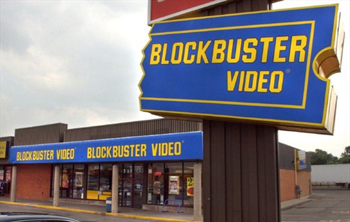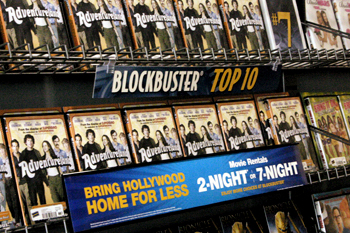The Death of a Bully: Blockbuster Canada
I’ve posted a review of Taylor Morden’s recent documentary, The Last Blockbuster (2020) from Passion River on Blu, which chronicles a bit more than what the title declares. Yes, there’s nostalgia, and some archival footage within the feature-length film, but the history of the once-great / fanged predatory chain is also covered in fairly satisfying morsels, but from the perspective of the U.S., where BB was born, grew up, nurtured into a multinational, and whose final CEO’s made some grievous decisions.
A long time ago, BB had stores across the globe, and I remember back in 2011 when the chain decided to close its doors for good, although what transpired simultaneously in Canada was a little different.

Some time hopping is required here to do some tracking, but let’s start in 2005 when BB decided to scrap late fees – the bane of renters. Perhaps feeling the ploy would generate better relations among renters and attract those turned off by fees, BB may also have believed they could better Netflix with Total Access, their online booking / mail variant, but late fees were not exactly gone. The revision was a complicated series of grace periods, full price charge, and restocking fee which lacked the simplicity of ‘If you’re late, here’s the daily charge that accrues, and what you owe so far. If not returned by this date, your credit card on file will be charged.’
As snipped from WebWire:
Under the “no late fees” program, Blockbuster still has due dates — one week for games and two days or one week for movies. However, if customers need to keep the product an extra day or two, they can, stress-free. Blockbuster now gives customers a one-week grace period at no additional charge. At that point, if customers want to keep the movie or game longer, they can. Blockbuster will automatically sell them the product, less the rental fee. If customers decide they don’t want to own the movie or game, they simply return the product within 30 days for a full credit to their account, less a minimal restocking fee.
By 2006, Canada’s Rogers Video / aka Rogers Communications, founded by media mogul Ted Rogers, had similarly followed suit and scrapped late fees in their video store operations, but not on video games, because they quickly saw the effects the convoluted policy had on BB Canada’s profits. BB’s plan was aimed at getting DVDs and Blu-rays back from tardy renters and career delinquents, and the penalties were reportedly less severe for those choosing to keep video games.
The ‘No More Late Fees’ policy was given a huge push in obnoxious ads, and although it was too late for BB to bring back the penalties – an about-face would’ve been quite embarrassing – for Rogers, according to several irate renters, they kind of brought it back in 2007, but with new wording.
BB Canada also mandated live product (movies and video games) be accessible on the floor instead of behind the counter, and as the manager of a large, former west end location described to me in the early 2000’s, thefts were constant, and easy, because staff were discouraged from intervening whatsoever, and he store’s high volume of customers made it simple to swipe the costliest inventory: video games.

Theft plus the loss of late fees took a major chunk out of store profits, as did large locations designed to display face-up videos on wide racks, including new releases, which could number as high as 100 – an unheard of and an impossible quantity for any mom & pop shop to acquire.
The guarantee to have more of new titles was also ill-thought, as not every major studio releases is a hit, so painting the new release section with a profitable and critical favourites plus utter crap made no sense. Indie stores were less shackled to corporate rules, and could bump or reduce new title orders to minimize being saddled with deadwood that wouldn’t sell well as used stock weeks later.
Rogers had some large stores, and there were outlets that attracted customers for less cinematic needs, like paying cable bills, setting up cable TV packages, and signing up for cell phone plans in a country that continues to have one of the world’s most monopolistic telecom industries in the world (and one of the most expensive for subscribers, as well).
As Rogers began to emphasize cellphones over movies in their stores, BB was still tied to movies – their raison d’etre – and when the corporation decided to fold in 2011, there was some interesting scuttlebutt on the Canadian side.
Because BB Canada was less of a corporate mess (and perhaps taking a cue from Rogers’ successful media-morphing to cellphones), they struck a deal with indie company Wind Mobile in 2009. (In 2016, Wind Mobile was eventually acquired by the country’s tertiary cable TV provider Shaw Communications, and as happens in my county’s wacky telecom environment, it was announced in March of 2021 that Rogers and Shaw would merge, creating an even bigger behemoth.)
BB Canada operated “independently,” and its stable operations subsidized the blunders of its mothercorpse south of the 49th parallel, which in September of 2010, filed for Chapter 11 bankruptcy, but being unable to sort out its finances with potential buyers and appease government regulators, BB America was liquidated.
In April of 2011, Dish Network won BB America in an auction, and part of their ownership included the BB name and logo. Meanwhile, in May, BB Canada went into receivership. Because the Canadian company could not use the BB name, lacking the iconic branding pretty much meant death. Unless a buyer was willing to buy the existing operations and retrofit them as a new or as part of an existing company – as happened when Sunrise Records bought HMV Canada’s shops in 2019 – BB Canada existed as a corporation whose face had been cleaved off, almost out of spite by its greedy parent.
Now… there was one peculiar ‘consideration’ coming from an unlikely party.
What began as a music-centric company and evolved into a mixed media distributor and retailer, Company X (I can’t name them) had become flush with cash from their music and video operations, and after going on a buying spree, in 2005 sold their new entities to another Canadian behemoth.
(That enormous entity later bought a floundering film company which had become an obnoxious library squatter and licensor, and snapped up a small TV producing entity after they had completely screwed up the Canadian distribution of premiere home video labels during the Christmas season. The megacorp was sold in 2019 to a U.S. toy company that was particularly interested in a specific line of highly popular porcine-studded kiddie videos which the megacorp owned.)
Once again flush with cash, the former owners of Company X briefly – briefly – considered buying BB Canada, but wisely stepped away, as the industry was moving from a peak era of sales, rentals, and special edition boxed sets to its worst.
The home video industry’s nosedive happened slowly, but it became steep at one angle, and the effects from weakening consumer purchasing & renting, and studios convinced physical media was dead, made Netflix’ Canadian debut in September of 2010 highly fortuitous.
A year after BB folded, Rogers shuttered its video rental shops in April of 2012, but another blow for bricks & mortar stores – especially in Toronto – was the severe cold snap that winter, and the ice storm of 2013 which made it a no-brainer for people to avoid going outdoors to rent & return media, and instead get cozy for everything and anything Netflix was offering for $7 per month – a cheap price which, as done by BB, was augmented when customers were hooked, and the competition had been weakened.
In the fall of 2012, Toronto had 12 physical video stores, and by early, pre-covid 2020, there were maybe 3. My city is still lucky to have a handful of shops, but what happened stateside and around the world – seeing small & medium sized chains & franchises, and eccentric local shops close in small and very major urban centres – stems in part from the shift as consumers and a swathe of younger generations moved to digital & streaming, veteran owners retiring, plus landlords wanting a greater rent when leases came to term.
Now, as sour & dour the last few graphs may read, it’s contextual to the factors that massaged BB’s inevitable demise, and certainly in the Age of COVID, that wretched bug which has cost lives and wreaked hell on the creative arts and small businesses, the survival of any video store, is tough.
Had BB as a global chain lasted as a media portal with licensing agreements and niche distributor of physical media in film, TV, special interest, music, and media devices, it’s tough to say whether COVID would’ve killed it outright, but diversifying your offerings to attract everyone doesn’t work across the board, city to city, state to state, country to country.
The flagship of a longtime, Toronto-based video rental & sales shop folded when the owners decided to retire in 2017; was brought back from the ashes by a former patron a year later; and folded in less than 12 months in 2019. at the time of its closing, its stock included videos, music, memorabilia, and other niche offerings which couldn’t sustain business.
Like many indies, the owner of The Last Blockbuster in Bend, Oregon, knows her clientele and core business, and at least in pre-COVID times, it’s longtime survival makes sense: a well run shop managed and staffed by a great team who care about what they do, and emphasizing what the store offers, and what sets them apart from sterile streaming services.
I have bitched about the need to adapt to change in prior blogs; I penned a more caustic piece on BB’s demise in 2011, and in 2013 for Video Store Day, I cited some of the video shops I frequented, plus samples of rental catalogues from 1982. The tone is of the times, and with one editorial change – highlighting the Toronto shops that have since passed away – they remain as-is, so to speak.
There is a limit as to how much change is possible, and for how long the Good Fight goes on, but to add a starker contrast, there’s people who haven’t visited a rental shop in years and one-time nostalgia tourists wanting a one-time fix, and there’s regular renters and buyers in a community who are part of an ongoing symbiotic relationship; in the latter light, neither can survive without the other
One location, one town, and a brand which remains a draw for a niche clientele who enjoy the practicality, and value, of pure physical media and the social and experiencial accoutrements.
Stay Safe, and Fuck COVID.
Mark R. Hasan, Editor
KQEK.com
Category: EDITOR'S BLOG

















Connect